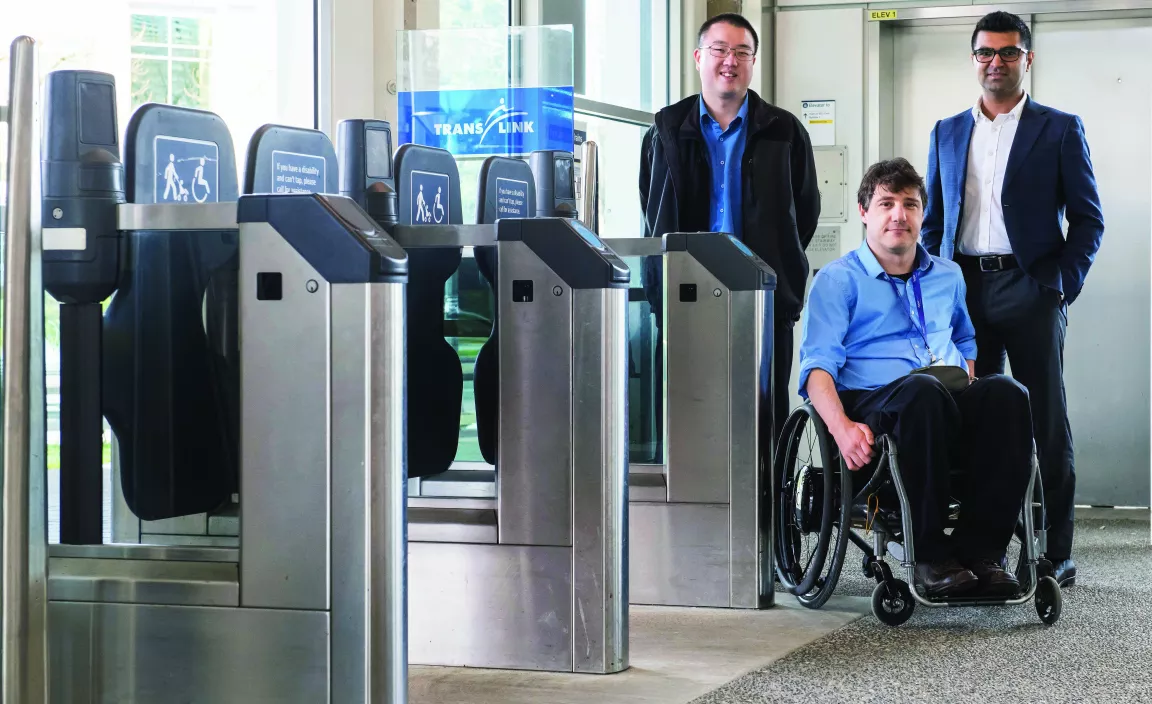Modern Technology, Inclusive Cities
Computer Science graduates discovering solutions for urban challenges

Technology is transforming the way we live and a pair of UNBC Computer Science graduates want to ensure everyone has the chance to benefit.
Ashish Sachdeva and Han Wei Chan formed Vancouver-based tech startup Hyperlight Systems with the goal of creating smarter cities, including eliminating barriers that continue to exist for people with disabilities.
“I have a passion for using technology to solve complex urban problems,” Sachdeva says. “But when we come up with solutions, we need to be inclusive in every way.”
Case in point is the company’s elegant solution to a challenge facing TransLink, the public transit provider in Metro Vancouver.
In 2016 TransLink launched a new fare payment system and installed fare gates at SkyTrain and SeaBus stations across its network. Some transit users with mobility challenges soon discovered that the fare gates didn’t work for them because without the use of their hands, they couldn’t tap the fare cards to open the gates.
That’s where Hyperlight came in with the idea of using Radio Frequency Identification (RFID) sensors above the fare gates and providing RFID cards to transit users with disabilities. When they approach a fare gate, the sensor detects the RFID card and the gate opens automatically, enabling the passenger to access the transit system independently.
The Hyperlight team engaged Brad Zdanivsky, a former UNBC Computer Science student, to test the gates. Zdanivsky was in his first year of studies at UNBC in 1994 when he sustained spinal cord injuries in a car crash that resulted in him becoming a quadriplegic.
“The whole point for the user is that the interface is invisible,” says Zdanivsky, who now uses SkyTrain on a daily basis.
TransLink launched the universal fare gate access program in January and is installing sensors at stations across its network throughout the year. Zdanivsky is testing each new installation to ensure the user experience is consistent.
It was the most high-profile success to date for Hyperlight, which has its roots in Computer Science and Business Professor Dr. Waqar Haque’s lab at UNBC.
Both Sachdeva and Chan studied under Haque’s supervision, gleaning insights both in the classroom and by working on projects with external research partners.
Sachdeva, an international student from India, came to UNBC to research software applications big data as a master’s student. Chan, from Maple Ridge, travelled to Northern B.C. as an undergraduate student keen on learning more about computer hardware.
“They are two very different kinds of people in terms of their interests, but their interests come together very nicely,” says Haque. “It’s gratifying to see graduates achieve success in the private sector.”
Working on research projects at the graduate and undergraduate level gave Sachdeva and Chan a taste of what it’s like to work on real-world solutions and collaborate with external clients.
“It’s not only a core computer science experience, you get real-world experience,” Haque says of opportunities his lab provides to students. “You look at applied problems, not textbook problems. I think that combination of experience is what makes my students really valuable as they begin their careers.”
Sachdeva was also inspired by the scholarship opportunities available.
“The financial support offered by UNBC changed my life,” Sachdeva says. “It made it possible for me to earn my master’s degree and gain the knowledge and experience to accelerate my career.”
Like many of the graduates of Haque’s lab, both Sachdeva and Chan got their first jobs at Northern Health after graduation. They re-united in Vancouver a couple of years later to found Hyperlight.
The company has already grown to include 14 employees and continues to expand. They are working to improve accessibility across the world and are preparing to launch their next product, "hands-free elevators," to further increase accessibility at transit stations.
“We have done research to understand how this technology can be used in public transit systems in other cities in Canada and around the world,” Sachdeva says. “It’s a solution to a local challenge, which could have a global impact.”